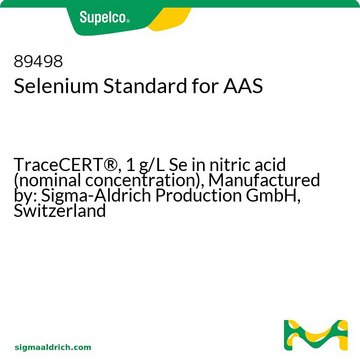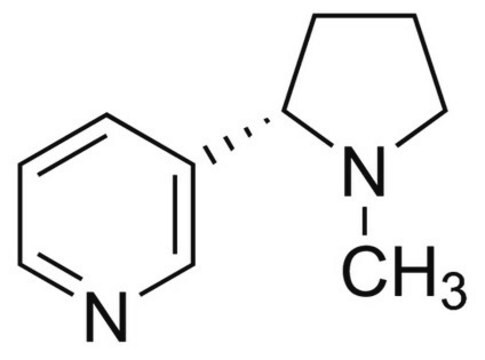77234
Perchloric acid
puriss. p.a., ACS reagent, packed in coated, shock- and leak-protected glass bottle, ≥60% (T)
Synonym(s):
PCA
About This Item
Recommended Products
grade
ACS reagent
puriss. p.a.
Quality Level
form
liquid
quality
packed in coated, shock- and leak-protected glass bottle
concentration
≥60% (T)
impurities
≤0.00005% free chlorine (Cl)
≤0.001% total nitrogen (N)
ign. residue
≤0.003% (as SO4)
density
1.670 g/cm3
anion traces
chlorate (ClO3-): ≤10 mg/kg
chloride (Cl-): ≤3 mg/kg
phosphate, silicate (as SiO2): ≤5 mg/kg
sulfate (SO42-): ≤10 mg/kg
cation traces
Ag: ≤0.1 mg/kg
Al: ≤0.05 mg/kg
As: ≤0.05 mg/kg
Ba: ≤0.02 mg/kg
Bi: ≤0.1 mg/kg
Ca: ≤0.5 mg/kg
Cd: ≤0.05 mg/kg
Co: ≤0.05 mg/kg
Cu: ≤0.1 mg/kg
Fe: ≤1 mg/kg
K: ≤0.1 mg/kg
Li: ≤0.02 mg/kg
Mg: ≤0.5 mg/kg
Mn: ≤0.02 mg/kg
Mo: ≤0.05 mg/kg
Ni: ≤0.1 mg/kg
Pb: ≤0.05 mg/kg
Sr: ≤0.02 mg/kg
Tl: ≤0.05 mg/kg
Zn: ≤0.1 mg/kg
SMILES string
OCl(=O)(=O)=O
InChI
1S/ClHO4/c2-1(3,4)5/h(H,2,3,4,5)
InChI key
VLTRZXGMWDSKGL-UHFFFAOYSA-N
Looking for similar products? Visit Product Comparison Guide
General description
Application
- Development of the Chromatographic Method for Simultaneous Determination of Azaperone and Azaperol in Animal Kidneys and Livers.: This study used perchloric acid for the sample preparation in HPLC analysis, which is crucial for veterinary drug residue analysis in food safety research (Koska and Kubalczyk, 2022).
- Development of a High Performance Liquid Chromatography with Diode Array Detector (HPLC-DAD) Method for Determination of Biogenic Amines in Ripened Cheeses.: The research utilized perchloric acid for sample deproteinization, demonstrating its application in food chemistry for the quality control of dairy products (Pawul-Gruba et al., 2022).
- Vibrational and impedance analysis of the beta-stannic acid samples plasticized by perchloric acid.: This study employed perchloric acid in the plasticization process, essential for materials science research on improving the properties of beta-stannic acid (Karelin et al., 2022).
- Measurement of tigecycline in dried blood spots by LC-MS/MS and comparison tigecycline concentrations between whole blood and plasma.: Perchloric acid was used in the sample preparation for LC-MS/MS analysis, crucial for pharmacokinetic studies in clinical research (Yan et al., 2023).
- SiO(2)-supported HClO(4) catalyzed synthesis of (Z)-thiazolylhydrazonoindolin-2-ones and their electrochemical properties.: The research highlights the use of perchloric acid as a catalyst, demonstrating its application in organic synthesis and electrochemistry (Shaik et al., 2022).
Other Notes
Signal Word
Danger
Hazard Statements
Precautionary Statements
Hazard Classifications
Acute Tox. 4 Oral - Eye Dam. 1 - Met. Corr. 1 - Ox. Liq. 1 - Skin Corr. 1A - STOT RE 2
Target Organs
Thyroid
Storage Class Code
5.1A - Strongly oxidizing hazardous materials
WGK
WGK 1
Certificates of Analysis (COA)
Search for Certificates of Analysis (COA) by entering the products Lot/Batch Number. Lot and Batch Numbers can be found on a product’s label following the words ‘Lot’ or ‘Batch’.
Already Own This Product?
Find documentation for the products that you have recently purchased in the Document Library.
Customers Also Viewed
Our team of scientists has experience in all areas of research including Life Science, Material Science, Chemical Synthesis, Chromatography, Analytical and many others.
Contact Technical Service









